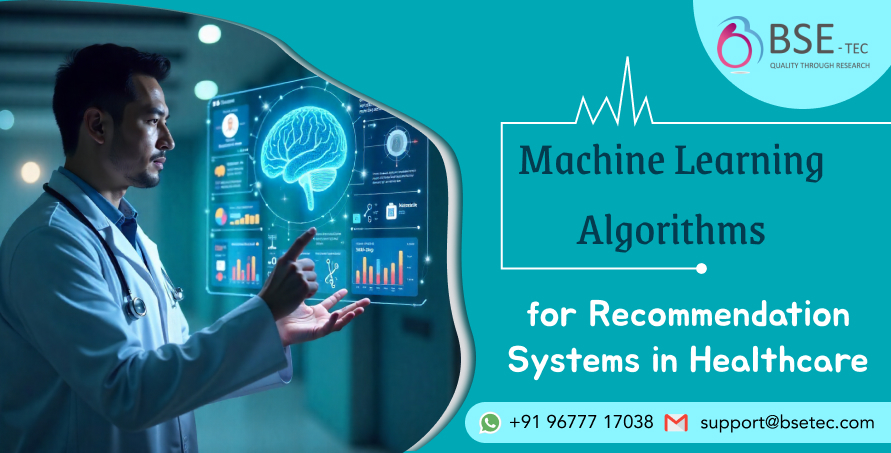
Healthcare is rapidly embracing recommendation systems powered by machine learning to provide personalized treatment, medication suggestions, and preventive care. In real-time AI-driven healthcare platforms that use cutting-edge algorithms to deliver patient-centered recommendations. We’ll explore the key machine learning algorithms for recommendation systems in healthcare, how development companies like BSEtec implements them in real-time, and why they matter for modern healthcare solutions.
What is Machine Learning?
Machine Learning (ML) is a branch of artificial intelligence that enables computers to learn from data and improve over time without being explicitly programmed. Instead of following fixed instructions, ML algorithms analyze patterns in data, make predictions, and adapt based on feedback.
In simple terms, ML is like teaching computers to “learn by experience,” much like humans do.
Why is Machine Learning Needed?
The modern world generates enormous amounts of data every second – from online purchases to medical test results. Traditional systems cannot process or make sense of such large datasets. This is where machine learning is essential.
Key reasons why ML is needed:
- Data-driven decisions: Automates insights from complex datasets.
- Accuracy & efficiency: Reduces errors in decision-making.
- Personalization: Delivers tailored recommendations and treatments.
- Automation: Simplifies repetitive and complex tasks.
Where Can Machine Learning Be Used?
ML applications extend across industries:
- Healthcare: Personalized treatments, disease prediction, drug discovery.
- Finance: Fraud detection, credit scoring, stock predictions.
- Retail & E-commerce: Product recommendations, customer insights.
- Transportation: Route optimization, autonomous vehicles.
- Entertainment: Movie/music recommendations.
- Manufacturing: Predictive maintenance, quality control
How Machine Learning Simplifies Healthcare
Healthcare produces vast amounts of patient data—medical records, imaging, lab results, and real-time monitoring devices. ML simplifies this complexity by:
- Analyzing medical histories to suggest treatment plans.
- Predicting disease risks based on genetic or lifestyle data.
- Personalizing therapies for better patient outcomes.
- Optimizing hospital operations like resource allocation.
To move in deeper,
1. Collaborative Filtering (CF)
BSEtec uses user-based and item-based collaborative filtering to find similarities between patients and treatments.
- User-based CF: Recommends treatments based on patients with similar health histories.
- Item-based CF: Suggests similar medications or therapies often paired together.
The platform ensures to match patients with similar health records to recommend optimized treatment pathways for chronic diseases.
2. Content-Based Filtering
Content-based filtering is crucial in healthcare, as it uses treatment attributes like drug interactions, side effects, and medical guidelines. Suggesting physiotherapy routines for arthritis patients based on their medical conditions, preferences, and risk factors.
3. Matrix Factorization
Through methods like SVD and ALS, BSEtec identifies hidden patterns in patient-treatment interactions.Predicting effective treatment combinations for patients with multiple chronic illnesses, even when data is sparse.
4. Clustering Algorithms
We employ clustering techniques such as K-Means and Hierarchical Clustering to segment patients.Grouping patients into risk clusters and recommending preventive check-ups and wellness programs.
5. Classification Algorithms
With algorithms like Logistic Regression and Random Forests, our systems predict the likelihood of treatment success.Identifying whether a patient will benefit from chemotherapy and suggesting alternatives when required.
6. Deep Learning Approaches
BSEtec integrates Neural Collaborative Filtering, Autoencoders, RNNs, and Transformers for complex healthcare data.Creating adaptive cancer treatment recommendations using genomic data and historical therapy outcomes.
7. Reinforcement Learning (RL)
Our reinforcement learning models optimize treatment strategies dynamically.Adjusting insulin dosage recommendations in diabetes management apps based on real-time glucose levels.
Challenges and Ethical Considerations
- Data Security: We integrate HIPAA-compliant solutions for safe handling of patient data.
- Bias Reduction: Algorithms are trained on diverse datasets to ensure fairness.
- Transparency: BSEtec prioritizes interpretable models for clinician trust.
At BSEtec, we bring AI-powered recommendation systems to healthcare in real time, ensuring patients receive the right treatment at the right time. By combining collaborative filtering, content-based models, deep learning, and reinforcement learning, our solutions drive personalization, efficiency, and better patient outcomes.Contact BSEtec to invest in the right way for your business needs.


